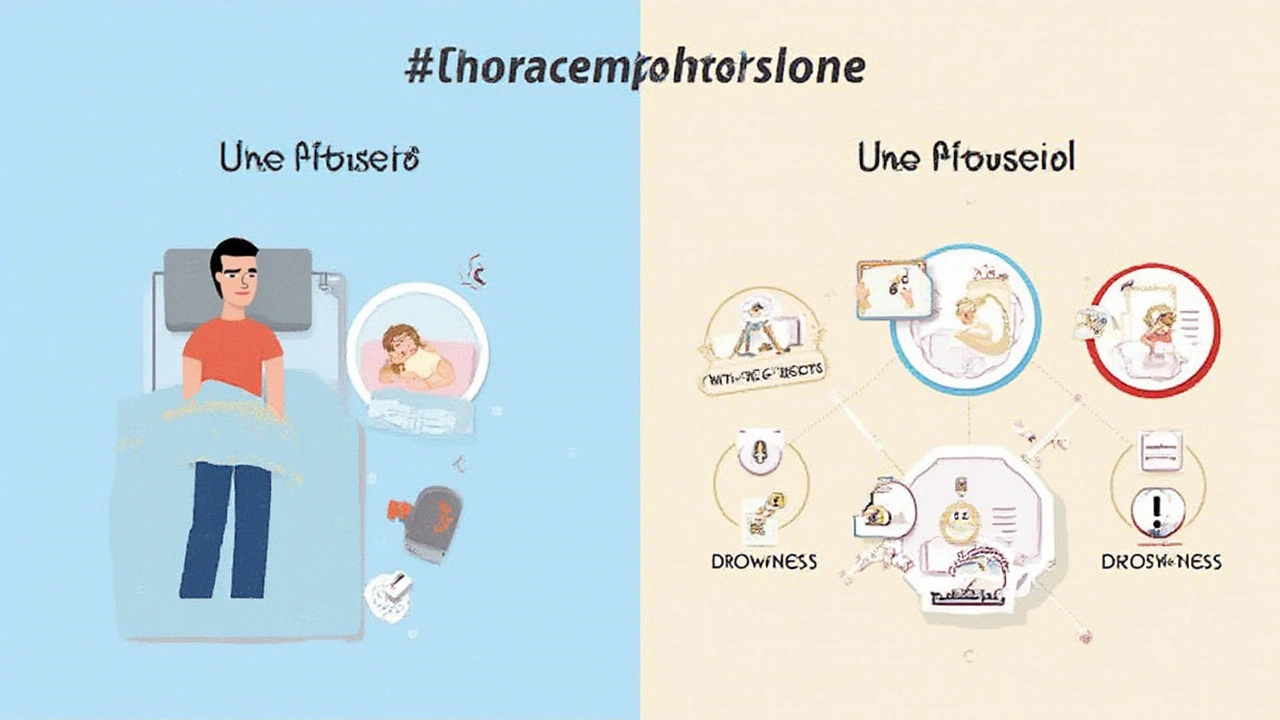Promethazine: Benefits, Side Effects, and Safe Use Explained
 Jul, 1 2025
Jul, 1 2025
Stuffed noses, itchy rashes, or waking up groggy after one too many nights tossing and turning—most of us have been there, hoping for relief from a tiny pill. It sounds dramatic, but one small drug called promethazine has had a massive impact on the way doctors treat allergies, nausea, and even trouble sleeping. You’ll spot it in all sorts of medicine cabinets, tucked away behind travel-size shampoo or pushed to the back next to expired cough syrup. So why does this old-school antihistamine remain one of the go-tos, even as the pharmacy shelves groan under the weight of newer options?
What Is Promethazine and How Does It Work?
This nifty compound was synthesized back in the 1940s, and honestly—medicine’s never been quite the same since. Promethazine belongs to a group called phenothiazines, but don’t get bogged down by the chemistry. Think of it as a bodyguard for your cells, blocking the signals from histamine, which is the culprit behind so many allergy symptoms like sneezing, watery eyes, and runny noses.
But it doesn’t stop there. Promethazine also acts on other nerve pathways in your brain, which helps calm nausea, vomiting, and that restless feeling some people get before surgery. That multitasking is why you’ll find it prescribed for more than just hay fever. The reason it’s so widely used? It works pretty quickly, usually within twenty minutes, and its effects can last for four to six hours. If you’ve ever taken promethazine before a car trip, you’ll know the wave of calm (and sometimes sleepiness) that washes over pretty fast.
Stuff like this matters, especially when people want quick relief and don’t have hours to wait around. Some forms—like tablets, syrups, and even rectal suppositories—give users flexibility depending on the situation. Kids too young to swallow pills, or patients too queasy for oral meds, can still get treated. In fact, it’s on the World Health Organization’s List of Essential Medicines, which isn’t an honor every drug gets. That means internationally, it’s seen as downright critical for a basic health system.
Medical Uses: Where Does Promethazine Shine?
Promethazine might sound like a single-use remedy, but it punches above its weight by covering a whole range of problems. Allergies are the obvious headliner—it helps tone down hives, hay fever, and other itchy skin conditions by shutting off the histamine faucet. But that’s really just Act One.
Where promethazine truly shines is as an antiemetic. Translation? It takes the misery out of nausea and vomiting: from motion sickness, post-op queasiness, or the yuckiness after chemotherapy. Handy stat here: Around 70% of chemo patients get some relief from promethazine paired with other meds. Parents will also recognize its syrupy forms prescribed for kids who can’t seem to keep food down during the flu.
The sleepiness caused by promethazine isn’t exactly a bug; in fact, doctors sometimes use it to help people struggling to get some shuteye. That’s why you’ll see promethazine in certain nighttime cold and cough syrups by legit brands. Some surgeons use it as part of a pre-surgery “cocktail” to relax patients and stop last-minute puke-fests that could complicate anesthesia.
Nobody should forget its use in calming itching—especially after nasty insect bites or in skin woes like eczema. People with chronic hives or intense allergic skin reactions can get real relief. And according to the American College of Allergy, Asthma & Immunology, promethazine is still prescribed for severe allergic reactions when faster, more modern treatments aren’t available, though it’s not the first-line choice.
| Medical Use | Typical Benefit |
|---|---|
| Allergies | Reduces sneezing, itching, runny nose |
| Nausea & Vomiting | Relieves symptoms from surgery, motion, chemo |
| Sleep Aid | Helps induce sleep in insomnia or pre-op settings |
| Itching (Pruritus) | Soothes hives, eczema, rashes |

Promethazine Side Effects: What to Watch For
Here’s the thing: every remedy comes with a price. Promethazine is no different. Probably the most common reaction is drowsiness, which, yes, sometimes is the whole point. For people trying to function at work or school, though, getting hit with heavy eyelids or a mental fog isn’t ideal. Some folks get dizzy or lightheaded. If you take it for the first time, don’t plan on driving or anything that requires full attention.
Dry mouth is another winner in this department. Sipping water or chewing sugarless gum helps, but it can get pretty annoying if you’re dealing with it for days. Meanwhile, kids seem to get revved up instead of knocked out—a classic paradoxical reaction (so don’t try using it to get your little tornado to sleep without a doctor’s OK).
A few side effects are more serious. Shallow breathing, heart pounding, restlessness, or serious allergic reactions call for emergency help. Rarer but real: promethazine can mess with blood cell counts or cause a weird thing called neuroleptic malignant syndrome—a medical emergency that includes high fevers, muscle stiffness, and confusion. Far less dramatic, but still a pain, it can sometimes cause blurred vision, trouble peeing, or constipation.
Here’s a quick, no-nonsense list of possible side effects to keep an eye on if you’re taking promethazine:
- Drowsiness and fatigue
- Dizziness or headaches
- Dry mouth/throat
- Blurred vision
- Constipation or trouble urinating
- Restlessness (especially in kids!)
- Rash or itchiness (ironically!)
- Chest tightness or breathing troubles (rare)
- Hallucinations (way more likely if you misuse it)
If any symptoms feel like red flags—hard-to-breathe, swelling, fever, muscle rigidity—call for help fast. Don’t just “wait and see.” Tips for everyday users: avoid alcohol while taking promethazine, and be upfront with your doc about all the meds and supplements you’re using, as it has a knack for clashing with other drugs (especially those for depression, anxiety, ADHD, or seizures).
How to Use Promethazine Safely
Pop quiz: Who shouldn’t grab promethazine from the medicine shelf? For starters, newborns. The FDA stamped a big red warning about giving it to kids under two due to a real risk for breathing problems. And—for everyone—never mix it with other sedatives, tranquilizers, or alcohol, unless you like living dangerously. People with glaucoma, prostate problems, epilepsy, or severe liver disease also need another plan.
Dose matters. Adults usually take 12.5 to 25 mg every four to six hours depending on the reason. Kids’ dosing is strictly weight-based, so trying to guess or “halve a tablet” for children is risky without a prescription. Promethazine can build up in your system, and taking more than you need won’t speed up relief. Instead, you’ll just crank up the side effects.
If you’re using it to stop motion sickness, the best tip is to take it thirty minutes to an hour before traveling. That stops queasiness before it begins. For allergies, a regular schedule works better than just chasing symptoms. And if you miss a dose? Wait until the next one—doubling up is a one-way ticket to drowsy town (or worse).
Pregnant or breastfeeding folks have to walk a fine line. While promethazine isn’t in the “absolutely not” zone, most doctors try other options first, especially in early pregnancy. The drug does get into breast milk and could make newborns drowsy or irritable, so talk it over before using. Oh, and stashing medication safely out of kids’ reach is common sense 101—especially something as strong as promethazine.

Myths, Misuse, and Why Promethazine Makes Headlines
Sip-and-see cocktails, purple drank, or “lean”—promethazine makes the news in ways nobody expected when it first hit the market. Mixed with codeine cough syrup, it’s been popularized by pop stars and athletes, but there’s nothing cool about the risks. This mix can slow your breathing to frightening levels, and it’s landed plenty of people in the ER or worse. In 2023, the U.S. reported over 18,000 ER visits linked to promethazine misuse (most involving codeine combos), so the hype is more hazard than help.
Another urban legend is that promethazine is safe for everyone just because it’s sold over the counter in some countries. That’s not the case in the U.S. or many parts of Europe, where it’s prescription-only, and for good reason. People chasing stronger sleep will sometimes double up on doses, but that’s a shortcut to memory problems, hallucinations, or even fatal overdoses. And using it long-term for sleep? Doctors steer away—other meds or behavioral therapies are safer and more effective for real insomnia.
Here’s one many people don’t know: promethazine, especially in liquid form, can react with certain syrups, turning liquids slightly purple (hence, “purple drank”). Overdose cases have spiked each time the trend goes viral, and hospitals see surges in promethazine-related poisoning each year after big music festivals or online challenges pop up.
Finally, don’t fall for online “miracle cure” stories. Promethazine isn’t a fix for COVID-19, food poisoning, or every bug under the sun. It’s powerful and useful in the right hands, but self-dosing—especially with outdated pills from your grandma’s cabinet—is asking for trouble.

Mariah Dietzler
July 17, 2025 AT 22:33Ok so promethazine, right? I've heard a bit about it but didn't really get how it actually works or why it's still a thing in 2025. From what I understand, it's mainly used for allergies and nausea, but seriously, the side effects list sounds kinda scary sometimes.
Like, drowsiness is such a common one, and honestly, that can mess up your whole day if you’re not expecting it. Plus, I read somewhere that it can cause some weird nervous system stuff if taken too much? That totally freaks me out a bit.
Does anyone know if it's still widely prescribed or have doctors shifted to other options now? Also, any personal experiences with it? I wanna hear balanced opinions before thinking about trying it for motion sickness on my next trip.
Jackie Zheng
July 20, 2025 AT 01:19Ah, promethazine. What an intriguing medication with a somewhat questionable reputation! The post does provide a concise overview, but let’s not gloss over the importance of understanding the pharmacodynamics and the justifications for its persistent use.
It functions as a phenothiazine derivative primarily antagonizing H1 histamine receptors, thereby offering antiemetic and sedative properties. However, the grammatical clarity in medical discussions is paramount: the side effects, such as respiratory depression and extrapyramidal symptoms, are not trivial and warrant deeper scrutiny.
Why, in this modern era, do we continue to rely on a drug with such a robust side effect profile? Are we ignoring emerging safer alternatives purely out of inertia or cost concerns? I’d appreciate perspectives grounded in evidence rather than hearsay.
Hariom Godhani
July 22, 2025 AT 04:06Honestly, it boils down to the fact that many folks treat medications like accessories rather than potent substances that can alter lives dramatically. Promethazine’s benefits might be documented and appreciated, but the reckless daring of those who consume it without judicious consideration is downright baffling.
This pharmaceutical agent, albeit effective for its intended purposes, carries latent dangers that echo through the neural pathways it tampers with. I cannot emphasize enough how the casual attitude displayed by some towards its side effects trivializes the gravity of potential consequences.
One must approach such drugs with reverence and caution, lest the ensuing complications spiral beyond control. Does anyone here truly weigh the moral responsibility attached to self-medication and the risks we flirt with by underestimating these chemical interactions within our bodies?
Jackie Berry
July 24, 2025 AT 06:53I appreciate the diverse insights here, and it reminds me just how complex our relationships with medications really are. Promethazine, with its historical roots and lingering presence, is a fascinating example of how tradition and modern medicine intersect.
In some cultures, this drug is a staple, whereas in others, it’s almost phased out. The difference often comes down to access and knowledge dissemination, which can sometimes be a double-edged sword. We need open conversations about the pros and cons, and also respect for the different ways it's integrated into healthcare systems worldwide.
Does anyone here have experiences from places where promethazine is the primary go-to for allergy or nausea? How do healthcare professionals there balance the safety concerns with the clear benefits?
Mikayla May
July 26, 2025 AT 09:39Just popping in with some info as a bit of an introvert when it comes to medicine discussions, but I think it's really important to stress how vital it is to follow dosing instructions carefully. Promethazine isn’t something you want to take lightly.
The sedation it causes can be pronounced and could interfere with driving or operating machinery, and the risk of respiratory issues should never be underestimated, especially in kids or older adults. Also, mixing it with alcohol or other depressants is a definite no-no—it seriously ups the dangers.
That said, in the right context and with proper medical guidance, it can be very effective. If anyone's feeling unsure about it, consulting a healthcare provider is the absolute best route.
Robert Jackson
July 28, 2025 AT 12:26Allow me to clarify this without the fluff or philosophical meandering: Promethazine is a medicine that demands respect and knowledge. The article barely scratches the surface. If you are not rigorously informed about its indications, contraindications, and the plethora of side effects, you are risking your health recklessly.
The risks include severe respiratory depression, potential fatal dysrhythmias, and irreversible tissue damage if administered incorrectly. This is not a substance for casual use or experimentation. Anyone downplaying its dangers is doing a disservice to the public.
Medical oversight is non-negotiable. Ignorance is not an excuse, and I strongly urge anyone considering this medication to strictly adhere to professional advice.
Robert Hunter
July 30, 2025 AT 15:13Well said. It's high time users and even some healthcare providers stopped treating promethazine as a benign over-the-counter remedy. The safety protocols must be emphasized, and the risks—especially for vulnerable populations—should be consistently highlighted.
In my experience advocating for patient education, I found that clear, assertive communication regarding medications like promethazine leads to better outcomes. People need to understand not only what it does but how its side effects can manifest dangerously when misused.
We should push for more comprehensive training and public awareness campaigns, so everyone gets the full picture beyond the brief info sheets.
Shruti Agrawal
August 1, 2025 AT 17:59thanks for all the info u guys shared... its a bit much but helpful 4 sure. ive seen ppl i care about use promethazine for so many different reasons. it really depends on the person how they react 2 it i guess. i agree tho, keeping an eye on dosage n side effects is super important.
does anyone know if there's any natural alternatives that are prob safer? i just worry about these meds sometimes. hope i didnt botheR anyone with my q.
Katey Nelson
August 3, 2025 AT 20:46ummm 🤔 so much talk about dangers and warnings, makes me wonder... like, could it be that sometimes we just overthink these meds while the actual risk is just really low if you follow the rules? i mean yeah side effects are scary but almost everything has them, right?
ive used promethazine once or twice for travel sickness and honestly it helped loads. sure, i felt sleepy but its not like that’s the worst thing in the world :) i get ppl having bad reactions but i think it kinda depends on how u take it and your own body too.
anyone else feel the same or am i missing something big here? 😅
Akhil Khanna
August 5, 2025 AT 23:33Hey folks! 😊 I totally get the range of opinions here. Promethazine is indeed powerful, but when used correctly under medical supervision, it can really do wonders, especially for nausea and allergic reactions.
That said, I agree it's not a one-size-fits-all solution. The individual variability means some people experience mild effects while others might have strong side effects. Keeping communication open between patients and healthcare pros is the best way to ensure safe use.
Also, cultural perspectives on medication can influence how drugs like promethazine are viewed and prescribed. So staying informed and respecting diverse experiences helps us all learn better ways to manage health.
Arthur Verdier
August 8, 2025 AT 02:19Well well, as someone who’s been down the rabbit hole of pharma paranoia, I can’t help but question why promethazine hasn’t been replaced yet by some ‘miracle cure’ for nausea or allergies, huh?
Is it just the endless wheel of profit that keeps this drug alive? The side effects surely don’t scream ‘safe’ if you ask me. It really feels like we’re fed the same tired solutions decades old while shiny new breakthroughs get buried or overpriced.
Anyway, for those thinking it’s a harmless helper, remember: underground info and anecdotal warnings should be taken seriously. Stay alert and question everything, especially when it comes to what goes into your body.